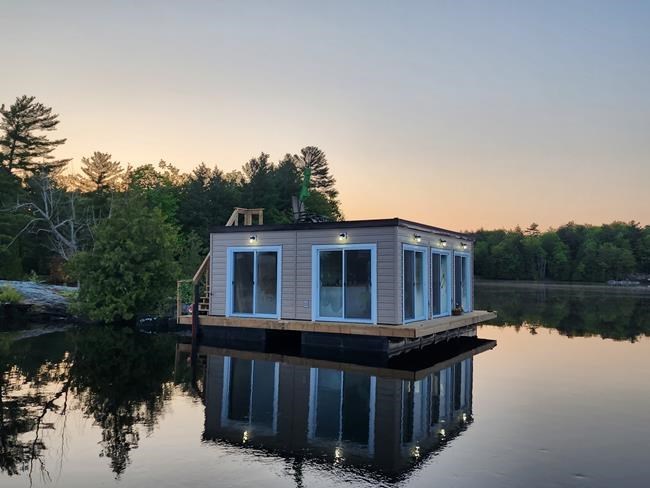TORONTO — Ontario is aiming to ban so-called floating accommodations from provincial waterways, with new regulations set to take effect July 1.
Natural Resources and Forestry Minister Graydon Smith said he has heard a number of concerns about the floating accommodations, such as rafts and barges that have buildings or structures on top intended for people to stay in overnight.
"A lot of people think it's esthetic, but it's actually environmental," he said.
"It's a home on water, and as a home operates it generates waste, grey water, black water, garbage and there's a concern that that could end up in the water."
But Joe Nimens, who builds floating homes in Port Severn, Ont., said he doesn't see the new rules as preventing him and his customers from using the homes.
"I do not see them changing anything," he said. "We're building them as fast as we can and we've got people ordering them faster than we can build them."
Nimens argued his floating homes are better for the environment than a new waterfront cottage.
"We don't cut any trees down," he said. "We don't dig up the land. We don't destroy the waterfront. We don't do any of that, and yet our customers get to have all the same enjoyment of the waterway."
The regulation defines floating accommodation as a floating building that can be used for overnight accommodation and "not primarily designed to be used for navigation."
But Nimens asserts that his floating homes are designed for navigation and he has registered them with Transport Canada as vessels.
Smith, the natural resources and forestry minister, said Ontario has written to the federal government, asking it to review that designation.
"We haven't had any response," he said. "We think it's a conversation worth having, to create uniformity around the approach and in the concern that what are designated as vessels now are not appropriate for our waterways."
Mike Burkett, mayor of the Township of Severn, has also called on the federal government to review the vessel designation.
"They are not navigable, these sea cans," he said. "You could probably put a motor on the back, but as far as trying to navigate it, I'd love to see him do it."
Burkett said he also wants the federal government to step in and create a similar regulation of its own. With floating accommodations banned on provincial waterways but not federally regulated ones, it creates a patchwork, he said.
The Severn River, for example, has parts that are provincially regulated and parts that are federally regulated, he said.
"You literally would have no idea. You may be thinking you're in the right, floating down a certain section of river and then it may change to a provincial (section) or it may change to federal, and we have that right in our township," Burkett said.
A spokesperson for federal Transport Minister Omar Alghabra said the government is "reviewing the regulations to assess any potential federal actions."
This report by The Canadian Press was first published June 23, 2023.
Allison Jones, The Canadian Press

